Kaohsiung resident Igor Scheurkogel is gay, proud and very busy.
He owns two bars, one art gallery and, if all goes as planned, will soon have a nonprofit as well. His most recent endeavor, the gay-oriented club Vanity, opened June 4 to a line three blocks long. It’s the city’s first gay-friendly club in more than six years and the fulfillment of a dream Scheurkogel has had since he first moved to Taiwan almost eight years ago.
The 29-year-old South African, whose projects are helping shape Kaohsiung’s foreign, art and gay communities, wouldn’t have it any other way.
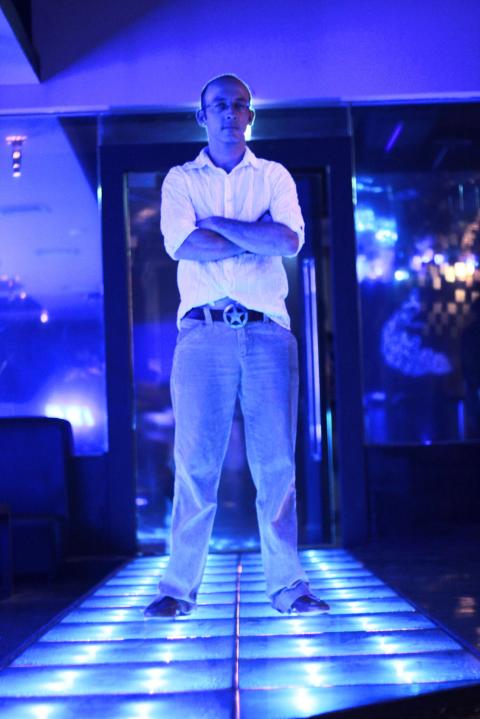
PHOTO: SCOTT WEATHERALL
“I’ve always had the desire to be more involved,” he said over a beer on a recent Friday at his “desk” — the bar at Vanity.
Scheurkogel opened the club to bridge the cultural and social gaps between gays and straights, gays and lesbians, foreigners and Taiwanese and every sub-category of society in between. Closer to his heart, Scheurkogel wants Vanity to be a place for young gays and lesbians to safely express themselves.
“When I moved here, I didn’t know I was gay,” he said. “Since then, I’ve seen Kaohsiung’s gay society open up, but it still needs a lot of protection.”
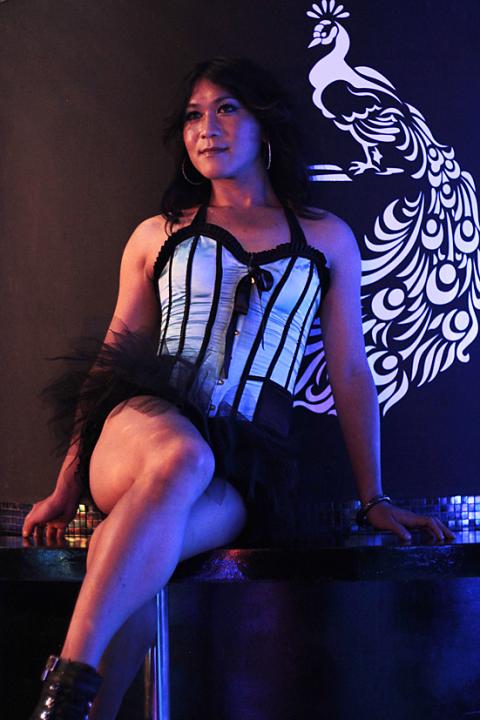
PHOTO: SCOTT WEATHERALL
Being gay in Taiwan isn’t easy, said Amy Lin (林昱君), who works as a counselor for the Taiwan Tongzhi Hotline Association (台灣同志諮詢熱線).
“Taiwan still has a lot of prejudice, but it’s changing slowly,” she said, her teardrop rainbow earrings swaying on a recent night out at Vanity.
She and two of her friends were sipping strawberry vodka cocktails — a specialty of Vanity’s shirtless bartender, Winston Yang (楊喬皓) — during one of the club’s first ladies nights.
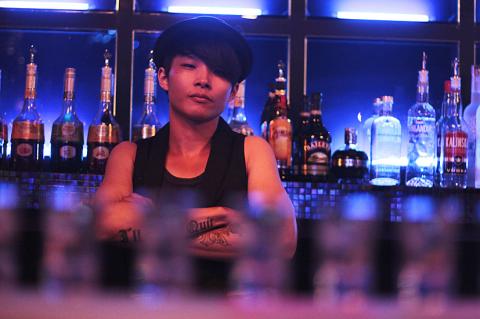
PHOTO: SCOTT WEATHERALL
Lin said that without Vanity, she and her friends wouldn’t have been out at a bar that night.
Unlike straight bars, which often hold ladies nights to draw in both genders, Vanity restricts the number of guys allowed in each Friday to give lesbians a hassle-free place to socialize, said the club’s co-owner, 28-year-old UK native Eva Deeson.
“Deeson” isn’t her real name. An English teacher by day, she uses a pseudonym to keep her identity from the school at which she works because her employers don’t know she’s a lesbian.
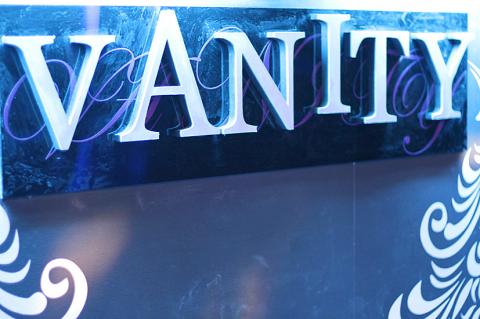
PHOTO: SCOTT WEATHERALL
She and Scheurkogel said they are trying to hack away at some of the stigmas in Taiwan surrounding gays and lesbians.
For example, Vanity has a zero-tolerance policy for drugs.
“There is a lot of drug use in the gay community,” said Scheurkogel, pointing to the last gay club in Kaohsiung, Speed, which he said opened eight years ago in the very spot Vanity now occupies. It closed down two years later amid speculation of rampant drug use by patrons.
Scheurkogel and Deeson said they also want to help gays and lesbians accept themselves. Self-esteem is the theme behind the entire club: Blue lights under a see-through floor line the entrance of Vanity like a catwalk. A stenciled peacock, the unofficial mascot of the venue, fans its tail feathers on a large column at the heart of the club. Mirrors line the bottom half of the column and most walls.
“We’re aiming at the people who don’t think much of themselves, the ones who are hiding all day so they don’t get fired or lose their family,” Deeson said.
The duo tried their best to create an environment that promotes socializing without being too forward. The club is illuminated by a flashing disco globe on the dance floor and chandeliers hanging from pink punched-out holes in the ceiling. There are no dark, secluded corners, and the lavender paint on the walls softens the rigid black furniture.
Acceptance of gender bending is another of the club’s themes. Vanity’s bathrooms aren’t marked male or female, and the waiters and waitresses can choose among a lace corset, a black vest (shirt optional), pants or skirt for their uniform.
Most of Vanity’s employees are in their early 20s, students or hairdressers around Kaohsiung who say the club is the one place they don’t have to hide.
A transgender who gave her name as Coco Chang (張孟娜) said in halting English that she’s “very happy” she can be herself at Vanity, and that she hasn’t felt more comfortable anywhere else. While the 28-year-old waited for the crowds to arrive, she twirled in her heels and skirt, admiring her reflection in the translucent front door.
She and her colleagues said Vanity was like a family, especially with the lack of acceptance from their own.
“Igor is our papa,” joked Travis Lee (李聖珈), a 20-year-old student who said only his mother knows he is gay. “He teaches us how to meet foreigners and not be shy.”
Scheurkogel said he feels a responsibility to show Kaohsiung locals that the city’s foreigners care about the community.
“Yes, we work here, but we also want to be involved,” he said.
Scheurkogel roots his altruism in his Christian upbringing, which he says took a strong hold in his heart while growing up during apartheid in South Africa.
His breakout in Kaohsiung’s social scene started with the Warehouse Art Gallery, which opened in March last year and hosts budding artists for NT$100 a day, a fraction of the NT$30,000 it can cost to display work at a bigger gallery.
The gallery’s success fed his drive to do more. He’s applying for nonprofit status for a community garden that will supply produce to the hungry in Asia, he regularly holds fund-raisers for natural disaster victims and he owns a popular wine and hookah bar in Kaohsiung’s trendy northern Zuoying neighborhood.
He said he gets through the late nights and headaches that come with his busy schedule by repeating five words: “live, dream and take action.”
“It’s all possible if you just go out and take it," he said.
Tonight from 9:30pm to 4am Vanity Club & Lounge hosts Kinky Party (前衛派對), featuring DJ Davis, DJ Cooper and DJ Matthew. Entrance is NT$150 before 11pm, NT$250 after. Those wearing underwear by New York designer 2(x)ist get in for free, and those wearing bondage-style clothing will receive a free shot.

When the South Vietnamese capital of Saigon fell to the North Vietnamese forces 50 years ago this week, it prompted a mass exodus of some 2 million people — hundreds of thousands fleeing perilously on small boats across open water to escape the communist regime. Many ultimately settled in Southern California’s Orange County in an area now known as “Little Saigon,” not far from Marine Corps Base Camp Pendleton, where the first refugees were airlifted upon reaching the US. The diaspora now also has significant populations in Virginia, Texas and Washington state, as well as in countries including France and Australia.

On April 17, Chinese Nationalist Party (KMT) Chairman Eric Chu (朱立倫) launched a bold campaign to revive and revitalize the KMT base by calling for an impromptu rally at the Taipei prosecutor’s offices to protest recent arrests of KMT recall campaigners over allegations of forgery and fraud involving signatures of dead voters. The protest had no time to apply for permits and was illegal, but that played into the sense of opposition grievance at alleged weaponization of the judiciary by the Democratic Progressive Party (DPP) to “annihilate” the opposition parties. Blamed for faltering recall campaigns and faced with a KMT chair

Article 2 of the Additional Articles of the Constitution of the Republic of China (中華民國憲法增修條文) stipulates that upon a vote of no confidence in the premier, the president can dissolve the legislature within 10 days. If the legislature is dissolved, a new legislative election must be held within 60 days, and the legislators’ terms will then be reckoned from that election. Two weeks ago Taipei Mayor Chiang Wan-an (蔣萬安) of the Chinese Nationalist Party (KMT) proposed that the legislature hold a vote of no confidence in the premier and dare the president to dissolve the legislature. The legislature is currently controlled
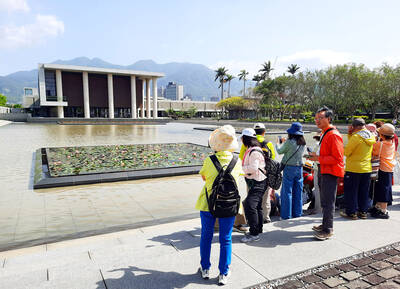
Dull functional structures dominate Taiwan’s cityscapes. But that’s slowly changing, thanks to talented architects and patrons with deep pockets. Since the start of the 21st century, the country has gained several alluring landmark buildings, including the two described below. NUNG CHAN MONASTERY Dharma Drum Mountain (法鼓山, DDM) is one of Taiwan’s most prominent religious organizations. Under the leadership of Buddhist Master Sheng Yen (聖嚴), who died in 2009, it developed into an international Buddhist foundation active in the spiritual, cultural and educational spheres. Since 2005, DDM’s principal base has been its sprawling hillside complex in New Taipei City’s Jinshan District (金山). But